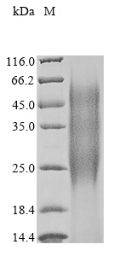Recombinant Enterobacter agglomerans Ice nucleation protein (iceE) , partial
CAT:
399-CSB-YP321430EKP-03
Size:
1 mg
Price:
Ask
- Availability: 24/48H Stock Items & 2 to 6 Weeks non Stock Items.
- Dry Ice Shipment: No




Recombinant Enterobacter agglomerans Ice nucleation protein (iceE) , partial
- CAS Number: 9000-83-3
- Gene Name: iceE
- UniProt: P16239
- Expression Region: 1129-1258aa
- Organism: Enterobacter agglomerans (Erwinia herbicola) (Pantoea agglomerans)
- Target Sequence: MAGERGKLIAGADSTQTAGDRSKLLAGNNSYLTAGDRSKLTAGNDCILMAGDRSKLTAGINSILTAGCRSKLIGSNGSTLTAGENSVLIFRCWDGKRYTNVVAKTGKGGIEADMPYQMDEDNNIVNKPEE
- Tag: N-terminal 6xHis-tagged
- Source: Yeast
- Field of Research: Others
- Assay Type: Developed Protein
- Relevance: Ice nucleation proteins enable bacteria to nucleate crystallization in supercooled water.
- Purity: Greater than 90% as determined by SDS-PAGE.
- Activity: Not Test
- Length: Partial
- Form: Liquid or Lyophilized powder
- Buffer: If the delivery form is liquid, the default storage buffer is Tris/PBS-based buffer, 5%-50% glycerol. If the delivery form is lyophilized powder, the buffer before lyophilization is Tris/PBS-based buffer, 6% Trehalose, pH 8.0.
- Reconstitution: We recommend that this vial be briefly centrifuged prior to opening to bring the contents to the bottom. Please reconstitute protein in deionized sterile water to a concentration of 0.1-1.0 mg/mL.We recommend to add 5-50% of glycerol (final concentration) and aliquot for long-term storage at -20℃/-80℃. Our default final concentration of glycerol is 50%. Customers could use it as reference.
- Molecular Weight: 15.7 kDa
- References & Citations: "Isolation and characterization of hydroxylamine-induced mutations in the Erwinia herbicola ice nucleation gene that selectively reduce warm temperature ice nucleation activity." Gurian-Sherman D., Lindow S.E., Panopoulos N.J. Mol. Microbiol. 9:383-391 (1993)
- Storage Conditions: The shelf life is related to many factors, storage state, buffer ingredients, storage temperature and the stability of the protein itself. Generally, the shelf life of liquid form is 6 months at -20℃/-80℃. The shelf life of lyophilized form is 12 months at -20℃/-80℃.
